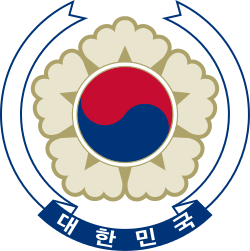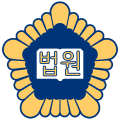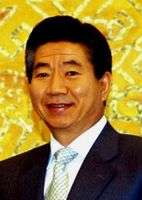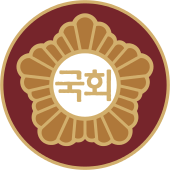South Korean presidential election, 2002
| | |||||||||||||||||||||||
| |||||||||||||||||||||||
| |||||||||||||||||||||||
|
| |||||||||||||||||||||||
| provinces and cities majority won by ■ – Roh Moo-hyun ■ – Lee Hoi-chang | |||||||||||||||||||||||
| |||||||||||||||||||||||
 |
| This article is part of a series on the politics and government of South Korea |
| Constitution |

|
|
Judiciary 
|
The 16th South Korean Presidential Election took place on 19 December 2002. The election was won by Roh Moo-Hyun of the ruling Millennium Democratic Party, who defeated Lee Hoi-chang of the Grand National Party by just over half a million votes.
Results
| Candidate | Party | Votes | % of votes | |
|---|---|---|---|---|
| Roh Moo-hyun | Millennium Democratic Party | 12,014,277 | 48.91% |  |
| Lee Hoi-chang | Grand National Party | 11,443,297 | 46.59% |  |
| Kwon Young-ghil | Democratic Labour Party | 957,148 | 3.90% | |
| Lee Han-dong | One National People Unite(하나로국민연합) | 74,027 | 0.3% | |
| Kim Gil-soo | Fatherland Defenders Party(호국당) | 51,104 | 0.2% | |
| Kim Yeong-Gyu | Socialist Party | 22,063 | 0.1% | |
| Jang Se-dong | Independent | Forfeited | - | |
| Invalid ballots | 223,047 | 0.6% | ||
| (Total electorate: 34,991,529 - Turnout rate: 70.8%) Total | 24,784,963 | 100% | ||
| regions · provinces · cities |  |
.jpg) | |||
|---|---|---|---|---|---|
| Roh Moo-hyun MDP |
Lee Hoi-chang GNP | ||||
| Votes | % | Votes | % | ||
| Sudogwon | Seoul | 2,792,957 | (51.3%) | 2,447,376 | (44.96%) |
| Incheon | 611,766 | (49.83%) | 547,205 | (44.57%) | |
| Gyeonggi | 2,430,193 | (50.65%) | 2,120,191 | (44.19%) | |
| Gangwon | 316,722 | (41.51%) | 400,405 | (52.48%) | |
| Chungcheong | Daejeon | 369,046 | (55.09%) | 226,760 | (39.82%) |
| Chungcheongbuk | 365,623 | (50.42%) | 311,044 | (42.89%) | |
| Chungcheongnam | 474,531 | (52.16%) | 375,110 | (41.23%) | |
| Honam (Jeolla) |
Gwangju | 715,182 | (95.18%) | 26,869 | (3.58%) |
| Jeollabuk | 966,053 | (91.59%) | 65,334 | (6.19%) | |
| Jeollanam | 1,070,506 | (93.39%) | 53,074 | (4.63%) | |
| Yeongnam (Gyeongsang) |
Busan | 587,946 | (29.86%) | 1,314,274 | (66.75%) |
| Ulsan | 178,584 | (35.27%) | 267,737 | (52.88%) | |
| Daegu | 240,745 | (18.68%) | 1,002,164 | (77.75%) | |
| Gyeongsangbuk | 311,358 | (21.65%) | 1,056,446 | (73.47%) | |
| Gyeongsangnam | 434,642 | (27.08%) | 1,083,564 | (67.52%) | |
| Jeju | 148,423 | (56.05%) | 105,744 | (39.63%) | |
See also
| Wikimedia Commons has media related to President of South Korea. |
This article is issued from Wikipedia - version of the 10/16/2016. The text is available under the Creative Commons Attribution/Share Alike but additional terms may apply for the media files.

